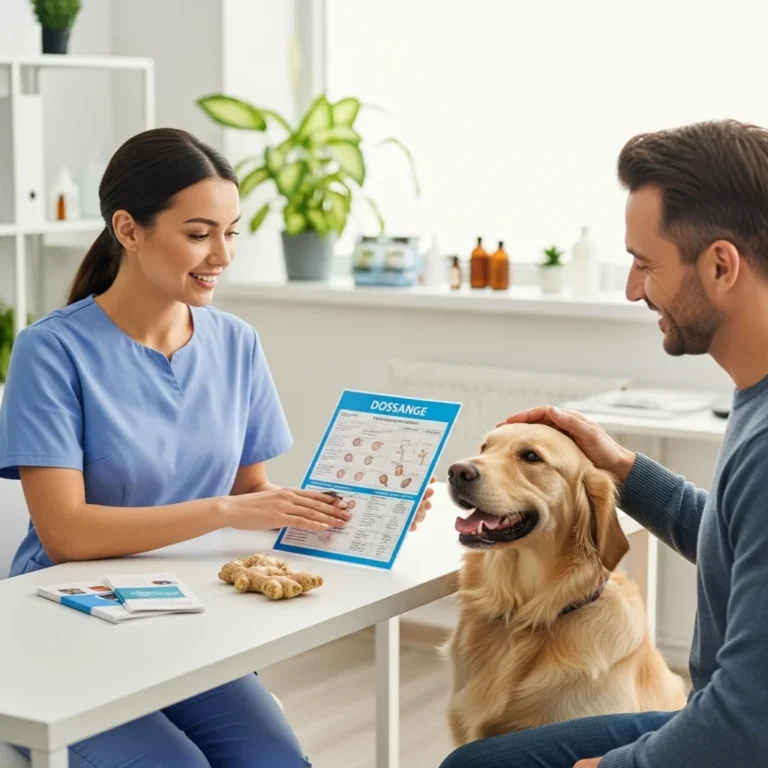
can dogs have ginger
If you’ve ever been in the kitchen with a curious dog giving you “the look,” you might have wondered: can dogs have ginger? It’s a good question—ginger is known in the human world for easing nausea, reducing inflammation, and spicing up meals—but when it comes to our four-legged friends, the rules are a little different.
In this article, I’ll walk you through exactly what the research and veterinarians say about giving dogs ginger: when it’s helpful, when it’s risky, how to offer it safely, and how to spot trouble. We’ll keep things practical and clear, so you’ll know whether ginger is a gentle addition to your dog’s diet—or something best avoided.
Safety and Toxicity
Is ginger safe for dogs to eat?
Yes—in moderation, ginger is generally considered safe for dogs. Many veterinary sources confirm that fresh or powdered ginger is not inherently poisonous to dogs. That said, “safe” doesn’t mean “no risk,” so caution is always wise.source
Dr. Sandra C. Mitchell, DVM (reviewer for PetMD), points out that although dogs can enjoy ginger, it should be introduced carefully, in small doses. source
Are any parts or forms of ginger (fresh root, skin, or powdered) toxic to dogs?
No part of the ginger plant (root, skin, powdered) is considered notably toxic to dogs when given in small amounts. source
However, risks can arise from how it’s prepared or combined:
- The skin of ginger might be harder to digest, so peeling or thoroughly mincing is safer.
- Powdered ginger or concentrated extracts are more potent—so their dosage must be halved or more carefully measured.
- Because ginger has mild blood-thinning properties, dogs with bleeding disorders or those on anticoagulant medications may be more vulnerable. source
Are ginger-flavored human foods like pickled ginger, candied ginger, or gingerbread safe for dogs?
Mostly not. These foods often contain ingredients that are harmful to dogs:
- Pickled ginger typically includes vinegar, salt, and sometimes sugar or additives, which aren’t friendly to a dog’s digestion. source
- Candied ginger or gingerbread often have sugar, fat, and potentially toxic add-ons like nutmeg or xylitol—nutmeg is toxic to dogs and can cause neurological symptoms. source
So while pure ginger might be okay, ginger-flavored treats from a human menu are best avoided.
What symptoms should I watch for that mean I should stop giving my dog ginger?
After introducing ginger, watch for:
- Vomiting
- Diarrhea or loose stools
- Abdominal discomfort or gas
- Excessive drooling
- Lethargy or weakness
- Signs of bleeding (e.g. unexplained bruising, bleeding gums)
If any of these pop up, stop ginger immediately and consult your veterinarian.
Benefits and Common Uses
What are the main health benefits of ginger for dogs (nausea relief, digestion, inflammation, joint health)?
Ginger’s reputation rests on several key benefits:
- Anti-nausea and digestive support: Dogs with upset stomachs or motion sickness may respond to small amounts of ginger, thanks to its carminative (gas-relieving) action. source
- Anti-inflammatory and joint health: Because ginger contains bioactive compounds like gingerols, it has antioxidant and anti-inflammatory properties. These may help reduce joint stiffness, particularly in older dogs. source
- Supportive antioxidant effects: Ginger may help counteract free radical damage, potentially supporting general health and aging. source
That said, it’s not a cure-all. As Purina’s pet expert team cautions, the scientific evidence in dogs is still limited, so ginger is best viewed as a supportive tool—not a replacement for medications or veterinary care. source
Can ginger help with motion sickness or travel-related vomiting in dogs?
Yes, there is reason to believe so. Dr. Countner, a veterinarian and owner of The Balanced Pet Vet, notes that giving a dog ginger about 30 minutes before a car ride can mimic the anti-nausea effect of human remedies. source
In fact, in one study, dogs treated with ginger during chemotherapy experienced less vomiting and nausea compared to those who didn’t receive it. source
Of course, always test with a small dose to be sure your dog tolerates it—and check with your vet if your dog is taking other medicines.
Does ginger help dogs with arthritis or joint inflammation, especially older ones?
Potentially. Because ginger has mild anti-inflammatory and antioxidant properties, some pet owners use it to help older dogs with arthritis or joint stiffness. source
Dr. Lori M. Teller (Texas A&M) says ginger may offer similar anti-inflammatory benefits in dogs as in humans—though she emphasizes we still need more veterinary studies. source
In other words: ginger might help ease discomfort—but it’s not likely to replace joint supplements or antiarthritic medications prescribed by your vet.
Preparation and Safe Ways to Feed
What forms of ginger are best for dogs (fresh, powdered, tea, or supplements)?
All of these forms can work, depending on your dog’s preferences and tolerance. According to VCA Animal Hospitals, ginger can be given as:
- Fresh root (peeled, grated, chopped)
- Powder
- Liquid tincture or extract
- Capsules or tablets made for pets source
The trick is controlling dosage and making sure it’s absorbable and gentle on their system.
How should I prepare ginger before feeding it to my dog (raw, cooked, grated, or steeped as tea)?
Here are practical options:
- Raw/peeled & minced or grated: Peel the outer skin, then finely mince or grate the inner root. This is a common, direct method.
- Light cooking or steaming: A gentle cooking can mellow the flavor and reduce the “heat.”
- Ginger tea: You can steep peeled ginger in hot water, cool it, then offer small amounts (mixed with water or diluted) to dogs. Just don’t add sweeteners, honey, or anything else that might be harmful.
- Capsule / tincture: If you use commercial ginger supplements made for pets, follow the product instructions carefully.
Dr. Countner says some dogs may dislike raw ginger’s strong flavor, so blending it into food or choosing baked/treat forms often works better. source
Can I add small amounts of ginger to my dog’s meals, treats, or homemade recipes?
Absolutely—many dog owners mix ginger into wet food, stir it into broths, or bake it into homemade dog treats (without harmful sugars or spices). Just use very small quantities and monitor how your dog reacts. source
One tip: always introduce ginger gradually, for example, starting with a pinch or tiny amount, before adding more. That gives your dog a chance to show any sensitivity.
Dosage, Frequency, and Serving Size
How much ginger can I safely give my dog based on weight or size?
This is one of the trickiest parts—because it depends on your dog’s weight, overall health, and the form of ginger. But here are generally accepted guidelines:
- American Kennel Club: No more than ¼ teaspoon for small dogs, up to ¾ teaspoon for larger breeds. source
- Great Pet Care / Dr. Teller & Dr. Countner: 20–50 mg per kg of body weight (or about 10–25 mg per pound) is sometimes cited as a guideline. source
- The Natural Dog Store:
• For dogs under 10 lb: ¼ teaspoon fresh ginger, up to three times daily
• 10–35 lb: ½ teaspoon fresh ginger, up to three times daily
• Over 35 lb: ¾ teaspoon fresh ginger, up to three times daily source
Because powdered or concentrated forms are stronger, you’ll want to reduce those doses further.
How often can dogs have ginger—daily, occasionally, or only as needed?
For most dogs, using ginger occasionally or for specific needs (like nausea or joint flare-ups) makes the most sense. Some cautious pet owners use small amounts daily, but that should only happen after veterinary approval:
- Use for occasional support—e.g. before travel or during tummy upset.
- Daily use may be acceptable in very small amounts if your dog tolerates it well and if recommended by a vet.
- Avoid prolonged use unless under veterinary supervision, especially if your dog has other health conditions.
Contraindications and Medication Interactions
Which dogs should not have ginger (pregnant dogs, those with bleeding disorders, or liver/kidney issues)?
Yes, there are dogs who should skip ginger (or use extreme caution):
- Pregnant or nursing dogs: Because ginger may stimulate uterine contractions, its safety in pregnancy hasn’t been firmly established. source
- Dogs with bleeding disorders (e.g. von Willebrand’s disease) or those on anticoagulant medications. Ginger’s mild blood-thinning effects could amplify bleeding risk. source
- Dogs with liver or kidney diseases: Because metabolism and elimination may be compromised, adding even safe supplements can add strain. Purina notes that dogs with kidney or liver disease may require extra caution. source
- Dogs scheduled for surgery or invasive procedures: It’s generally recommended to stop ginger well in advance (often ~10 days) to avoid bleeding complications. source
Can ginger interfere with certain medications, like blood thinners or diabetes medicine?
Yes. Ginger may interact with some medications:
- Blood thinners / anticoagulants (like warfarin, aspirin, etc.): Ginger can enhance bleeding risk. source
- Nonsteroidal anti-inflammatory drugs (NSAIDs): Some vets caution combining them with ginger, as both affect blood/clotting. source
- Diabetes or blood-glucose–lowering drugs: Ginger may influence blood sugar, so in diabetic dogs there could be interaction or risk of hypoglycemia. source
- Blood pressure or heart medications: Because ginger can mildly lower blood pressure, combining with antihypertensive drugs might amplify effect. source
Because of these possibilities, always share with your vet a full list of what your dog is taking—meds, supplements, herbs—before introducing ginger. source
Side Effects, Monitoring, and When to Call the Vet
What side effects or allergic reactions can occur from feeding ginger (vomiting, diarrhea, irritation)?
Most dogs tolerate ginger well in small amounts, but side effects can include:
- Mild digestive upset: gas, bloating, stomach discomfort, vomiting, diarrhea. source
- Skin irritation or allergic reaction: some dogs might react if ginger makes contact with their skin (redness, itchiness, hives). source
- Mouth or throat irritation (if pieces are too large or sharp)
- Bleeding oddities in sensitive dogs (bruising, bleeding gums)
When should I contact my veterinarian after my dog eats ginger?
Reach out to your vet if:
- You see persistent vomiting or diarrhea
- You notice blood in stool or urine, or unexplained bruising
- Your dog seems weak, lethargic, or has trouble breathing
- There’s swelling of face, lips, or throat (possible allergic reaction)
- Your dog is on medications and you suspect an interaction
In all such cases, treat ginger as a possible contributor and share how much and what form your dog had.
Age and Breed Considerations
Is ginger safe for puppies and senior dogs?
- Puppies: Because their digestive systems are still developing, any new food should be introduced super gradually. Very small amounts might be tolerated, but I’d strongly encourage consulting your vet first before giving ginger to puppies.
- Senior dogs: They may benefit from ginger’s anti-inflammatory or nausea-relief properties—but they also tend to have more chronic conditions (kidney, liver, heart), so you need extra caution. If your senior dog is already on medications, vet supervision is important.
Are some breeds or individual dogs more sensitive to ginger than others?
Yes, sensitivity varies—just like in humans. Some dogs might be more prone to digestive upset or allergic response. Breeds that are already predisposed to bleeding disorders or metabolic conditions (e.g. certain retrievers, dachshunds) may need more caution. The key is to start very small and monitor how your individual dog reacts.
Ginger-Containing Foods and Toxic Comparisons
Which human foods made with ginger are dangerous for dogs (like gingerbread with nutmeg, xylitol, or excess sugar)?
Here are common ginger-containing human foods you should avoid or be extremely cautious about:
- Gingerbread cookies / cakes: often include nutmeg (toxic to dogs), sugar, flour, butter, or even chocolate.
- Candied ginger: loaded with sugar and sometimes preservatives.
- Ginger snaps / biscuits: sugar and spices may be harmful in excess.
- Ginger-flavored baked goods with xylitol: xylitol is extremely toxic to dogs.
- Ginger ale or ginger beer: carbonated, high in sugar, often contain artificial sweeteners or sodium.
- Pickled ginger: as mentioned, vinegar, salt, sugar—unfriendly to dogs.
How does ginger toxicity differ from poisoning by other holiday spices or human treats?
Ginger itself is not typically toxic, but overconsumption leads to digestive upset or interaction risks. In contrast, nutmeg, xylitol, onions, chocolate, macadamia nuts, and raisins are outright toxic to dogs—even in small amounts. The danger with holiday treats is often from those additives, not the ginger itself.
For instance, nutmeg (common in gingerbread) contains myristicin, which can cause seizures and disorientation in dogs. Also, xylitol (sweetener) causes dangerous drops in blood sugar and liver failure. So when a treat includes ginger plus these ingredients, the risk skyrockets.
Practical Tips and Product Guidance
Can I give my dog store-bought ginger supplements made specifically for pets?
Yes, supplements made for dogs can simplify dosing and reduce risk of harmful extras. But be careful:
- Choose products specifically formulated for pets, not just human supplements.
- Look for transparent labels: ingredient list, dosage per weight, and veterinary oversight.
- Use trusted brands—ones with positive reviews and third-party testing if possible.
- Always start with a low dose and keep a close eye on your dog’s response.
How can I choose a reputable, dog-safe ginger product or supplement brand?
- Check for certifications (e.g. veterinary-recommended, NSF-certified for pets)
- Review ingredient lists: avoid additives, artificial sweeteners, excessive fillers
- Check dosage guidance is clear and appropriate for small and large dogs
- Look for reviews from other pet owners and quality assurance statements
- Ask your veterinarian; they may have brands they trust or have seen in practice
One good practice is to feed the supplement under supervision for a few days to ensure your dog tolerates it well before regular use.
please leave comment
you may like it






